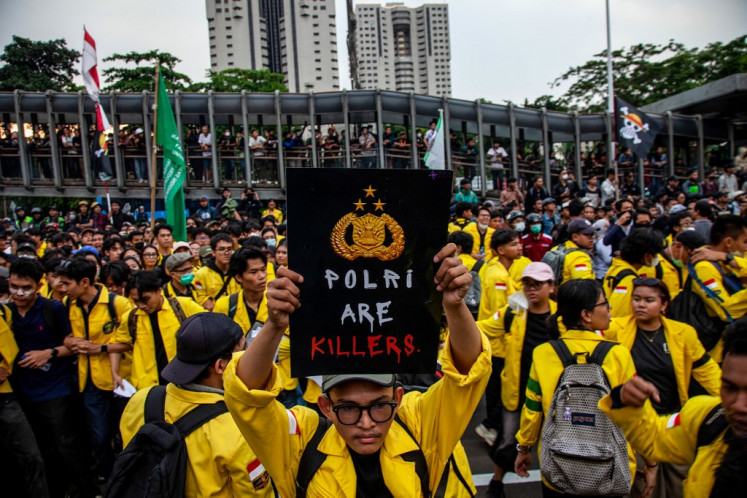Popular Reads
Top Results
Can't find what you're looking for?
View all search resultsPopular Reads
Top Results
Can't find what you're looking for?
View all search results‘Demolition man’ may face death penalty
Umar Patek, the alleged terrorist mastermind of the 2002 Bali bombing that killed more than 200 people, may face a death sentence for conspiring to commit terrorism
Change text size
Gift Premium Articles
to Anyone
U
mar Patek, the alleged terrorist mastermind of the 2002 Bali bombing that killed more than 200 people, may face a death sentence for conspiring to commit terrorism.
During his first trial session on Monday at the West Jakarta District Court, prosecutors slapped Umar with several additional charges, including premeditated murder, illegal possession of explosives and hiding information about terrorism.
Prosecutor Bambang Suharyadi also charged Umar, whose real name is Hisyam bin Alizein, with procuring and assembling the explosives that killed 19 people in nine cities in Indonesia during the Christmas Eve church bombings in 2000.
“[Patek] will be facing a maximum penalty of death for his role in terrorism,” Bambang said.
Patek, dubbed the “demolition man” by colleagues, ended a nine-year flight from justice after he was caught by US special forces in Abbottabad, Pakistan, in January 2011 — just a few weeks before Osama bin Laden was shot dead by the US military in the same town.
US commandos had to shoot Patek, then Southeast Asia’s most-wanted terrorist, to capture him before he was extradited to Indonesia several months later.
He is the last living alleged senior perpetrator of the Bali bombing, after police killed suspects Dulmatin in 2009, Azhari in 2005 and Noordin M. Top in 2010.
Meanwhile, Imam Samudra and two other masterminds behind the Bali attack — brothers Amrozi Nurhasyim and Ali Ghufron — were convicted and then executed in 2008.
Their group was part of the Jamaah Islamiyah terrorist organization led by firebrand cleric Abu Bakar Ba’asyir, who is currently serving a 15-year prison sentence for aiding a terrorist training camp.
According to prosecutors, Patek and his alleged conspirators stashed 700 kilograms of explosives in four cabinets, which were loaded into a Mitsubishi L300 van along with a TNT bomb.
The van was detonated outside Padi Club and Sari Club on Bali’s iconic Kuta beach on Oct. 12, 2002.
“Patek knows how to assemble sophisticated explosive devices. He learned in Afghanistan,” Farihin, a convicted terrorist who was Patek’s senior when training in Afghanistan, said after attending the trial on Monday. “Unlike Dulmatin and the others, Patek was calmer and talked less.”
Patek’s lawyer, Hasludin Hatjani, denied prosecutors’ allegations, saying that his client did not mastermind the Bali plot. “Patek was on the scene because he was invited by the mastermind of the Bali bombing. His role has been overrated,” Hasludin said.
Indonesia, the world’s largest Muslim-majority country, has hunted down more than 700 terrorists after the Bali bombing, following a string of other bombings that rocked Jakarta, Bali and other places.
The 2002 Bali bombing made Indonesia a key battlefield in the terrorist struggle against Western facilities and interests, amid slack regulation on radicalism and wide supporters for radicals.

















